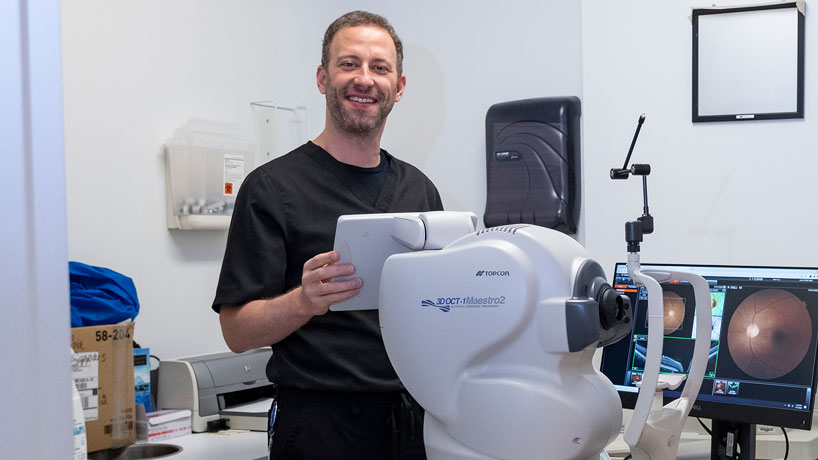
Dr. Tareq Nabhan recently accepted a position on the U.S. Department of Health & Human Services’ Medicare Evidence Development & Coverage Advisory Committee. (Photo by August Jennewein)
Dr. Tareq Nabhan knows he has to be on top of his game for his new position on the U.S. Department of Health & Human Services’ Medicare Evidence Development & Coverage Advisory Committee.
But although there will be a lot of homework required, Nabhan, an assistant clinical professor in the University of Missouri–St. Louis College of Optometry, hopes that serving on the committee will benefit the university and the college in untold ways.
Comprised of up to 100 experts in clinical and administrative medicine, biologic and physical sciences, public health administration, patient advocacy, health care data and information management and analysis, health care economics and medical ethics, MEDCAC provides independent guidance and expert advice on specific clinical topics to the Centers for Medicare & Medicaid Services.
Each meeting features around 15 members with specific knowledge of the topic in question who review medical evidence, listen to public testimony and then make recommendations. In short, the committee advises the government on what tools, tests, techniques and procedures should be covered through Medicare and Medicaid.
Nabhan was nominated to serve on the committee by American Optometric Association President Robert C. Layman, and he said earning the trust of the AOA is a victory in and of itself. In particular, he believes his experience with telehealth helped him earn the nomination. In fall 2021, Nabhan launched an “Introduction to Telehealth” course at UMSL, and gave a presentation on the subject to the AOA last year in Washington, D.C. Telehealth, he argues, is a way to democratize healthcare, and a tool that every provider should have in their toolbox.
“In the pandemic, everything changed because we weren’t allowed to see patients face to face,” he said. “Telehealth solutions in eyecare, if used correctly, work very well. So, they flew me out to D.C., and I gave a talk about my course and what we’re doing to help the community health center and how we’re using technology to bridge the gap between patient and provider. I think this appointment might be a consequence of what CMS will have to deal with now and going forward, as there are so many actors in the telehealth space now, and optometry and ophthalmology are going to have to deal with this more now than ever.”
According to the American Optometric Association, Nabhan’s appointment – along with fellow optometrist Dr. Sherrol A. Reynolds of Nova Southeastern University College of Optometry – marks the first time in over 10 years of annual attempts that an optometrist has been named to the committee. Nabhan said MEDCAC operates very much in line with his own evidence-based approach to medicine.
“In my telehealth course, I lecture on the technology and the validations to show whether they do or don’t work so students can be thoughtful about what they want to provide or be asked to provide,” he said. “With MEDCAC, we’re going to review and evaluate medical literature, we’re going to review technology. We’re going to examine information on the benefits and the harms and the appropriateness of medical procedures and services and ultimately help Medicare determine if that’s something that should be covered in Medicare.”
For Nabhan, it’s an honor to be able to serve the government as a special government employee through this two-year appointment and to represent both UMSL and the field of optometry at large. He believes his own experience as a student at UMSL prepared him well for this new role.
“I’m a beneficiary of our program,” Nabhan said. “I went through UMSL as an optometry student, and I took my academics very seriously, so I’m a consequence of that instruction from faculty. So now, being in this role, particularly at the national level, I can bring back what I learn from it to the program. It’s kind of reinforcing what we’re already teaching – that you want to be thoughtful, you want to understand what works and what doesn’t and you want to look at outcomes of patients. Being part of this committee will allow me to be exposed to a lot of that and really think about what’s happening at the national level and then be able to translate that to the classroom and ultimately have that translated into clinical practice.”
Although he hasn’t advised on a specific case just yet, Nabhan has studied previous sessions online, and he’s been fascinated by what he’s seen. While he’s eager to share his own knowledge and experience with the committee, he knows he’s also certain to learn a great deal himself.
“I’m just very impressed with the caliber and the dedication of candidates that I have gotten to see do this work,” he said. “I’m going to gain more than I could possibly give, although I’d love to be able to give more. I just hope to be able to continue to represent the profession, the college, the university and keep our patients at the center of the experience of quality, validated patient care.”














